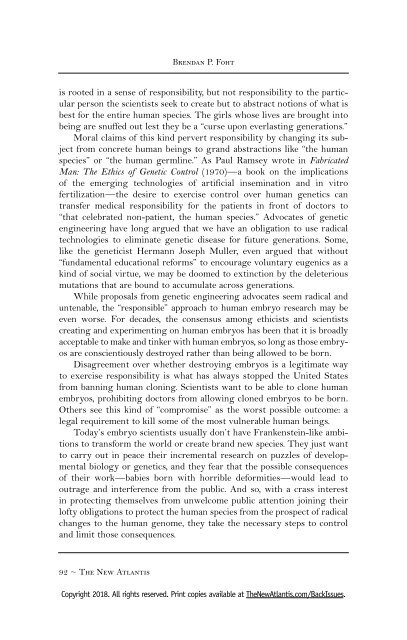The New Atlantis - Winter 2018 (Issue 54) uncompressed with cover
Create successful ePaper yourself
Turn your PDF publications into a flip-book with our unique Google optimized e-Paper software.
Brendan P. Foht<br />
is rooted in a sense of responsibility, but not responsibility to the particular<br />
person the scientists seek to create but to abstract notions of what is<br />
best for the entire human species. <strong>The</strong> girls whose lives are brought into<br />
being are snuffed out lest they be a “curse upon everlasting generations.”<br />
Moral claims of this kind pervert responsibility by changing its subject<br />
from concrete human beings to grand abstractions like “the human<br />
species” or “the human germline.” As Paul Ramsey wrote in Fabricated<br />
Man: <strong>The</strong> Ethics of Genetic Control (1970) — a book on the implications<br />
of the emerging technologies of artificial insemination and in vitro<br />
fertilization — the desire to exercise control over human genetics can<br />
transfer medical responsibility for the patients in front of doctors to<br />
“that celebrated non-patient, the human species.” Advocates of genetic<br />
engineering have long argued that we have an obligation to use radical<br />
technologies to eliminate genetic disease for future generations. Some,<br />
like the geneticist Hermann Joseph Muller, even argued that <strong>with</strong>out<br />
“fundamental educational reforms” to encourage voluntary eugenics as a<br />
kind of social virtue, we may be doomed to extinction by the deleterious<br />
mutations that are bound to accumulate across generations.<br />
While proposals from genetic engineering advocates seem radical and<br />
untenable, the “responsible” approach to human embryo research may be<br />
even worse. For decades, the consensus among ethicists and scientists<br />
creating and experimenting on human embryos has been that it is broadly<br />
acceptable to make and tinker <strong>with</strong> human embryos, so long as those embryos<br />
are conscientiously destroyed rather than being allowed to be born.<br />
Disagreement over whether destroying embryos is a legitimate way<br />
to exercise responsibility is what has always stopped the United States<br />
from banning human cloning. Scientists want to be able to clone human<br />
embryos, prohibiting doctors from allowing cloned embryos to be born.<br />
Others see this kind of “compromise” as the worst possible outcome: a<br />
legal requirement to kill some of the most vulnerable human beings.<br />
Today’s embryo scientists usually don’t have Frankenstein-like ambitions<br />
to transform the world or create brand new species. <strong>The</strong>y just want<br />
to carry out in peace their incremental research on puzzles of developmental<br />
biology or genetics, and they fear that the possible consequences<br />
of their work — babies born <strong>with</strong> horrible deformities — would lead to<br />
outrage and interference from the public. And so, <strong>with</strong> a crass interest<br />
in protecting themselves from unwelcome public attention joining their<br />
lofty obligations to protect the human species from the prospect of radical<br />
changes to the human genome, they take the necessary steps to control<br />
and limit those consequences.<br />
92 ~ <strong>The</strong> <strong>New</strong> <strong>Atlantis</strong><br />
Copyright <strong>2018</strong>. All rights reserved. Print copies available at <strong>The</strong><strong>New</strong><strong>Atlantis</strong>.com/Back<strong>Issue</strong>s.


